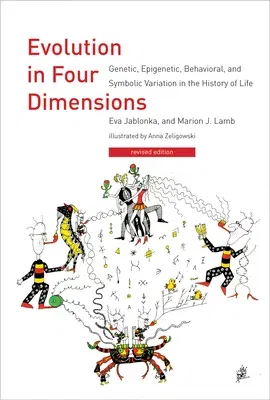A pioneering proposal for a pluralistic extension of evolutionary
theory, now updated to reflect the most recent research.
This new edition of the widely read Evolution in Four Dimensions has
been revised to reflect the spate of new discoveries in biology since
the book was first published in 2005, offering corrections, an updated
bibliography, and a substantial new chapter. Eva Jablonka and Marion
Lamb's pioneering argument proposes that there is more to heredity than
genes. They describe four "dimensions" in heredity--four inheritance
systems that play a role in evolution: genetic, epigenetic (or non-DNA
cellular transmission of traits), behavioral, and symbolic (transmission
through language and other forms of symbolic communication). These
systems, they argue, can all provide variations on which natural
selection can act.
Jablonka and Lamb present a richer, more complex view of evolution than
that offered by the gene-based Modern Synthesis, arguing that induced
and acquired changes also play a role. Their lucid and accessible text
is accompanied by artist-physician Anna Zeligowski's lively drawings,
which humorously and effectively illustrate the authors' points. Each
chapter ends with a dialogue in which the authors refine their arguments
against the vigorous skepticism of the fictional "I.M." (for Ipcha
Mistabra--Aramaic for "the opposite conjecture"). The extensive new
chapter, presented engagingly as a dialogue with I.M., updates the
information on each of the four dimensions--with special attention to
the epigenetic, where there has been an explosion of new research.
Praise for the first edition
"With courage and verve, and in a style accessible to general readers,
Jablonka and Lamb lay out some of the exciting new pathways of Darwinian
evolution that have been uncovered by contemporary research."
--Evelyn Fox Keller, MIT, author of Making Sense of Life: Explaining
Biological Development with Models, Metaphors, and Machines
"In their beautifully written and impressively argued new book, Jablonka
and Lamb show that the evidence from more than fifty years of molecular,
behavioral and linguistic studies forces us to reevaluate our inherited
understanding of evolution."
--Oren Harman, The New Republic
"It is not only an enjoyable read, replete with ideas and facts of
interest but it does the most valuable thing a book can do--it makes you
think and reexamine your premises and long-held conclusions."
--Adam Wilkins, BioEssays

